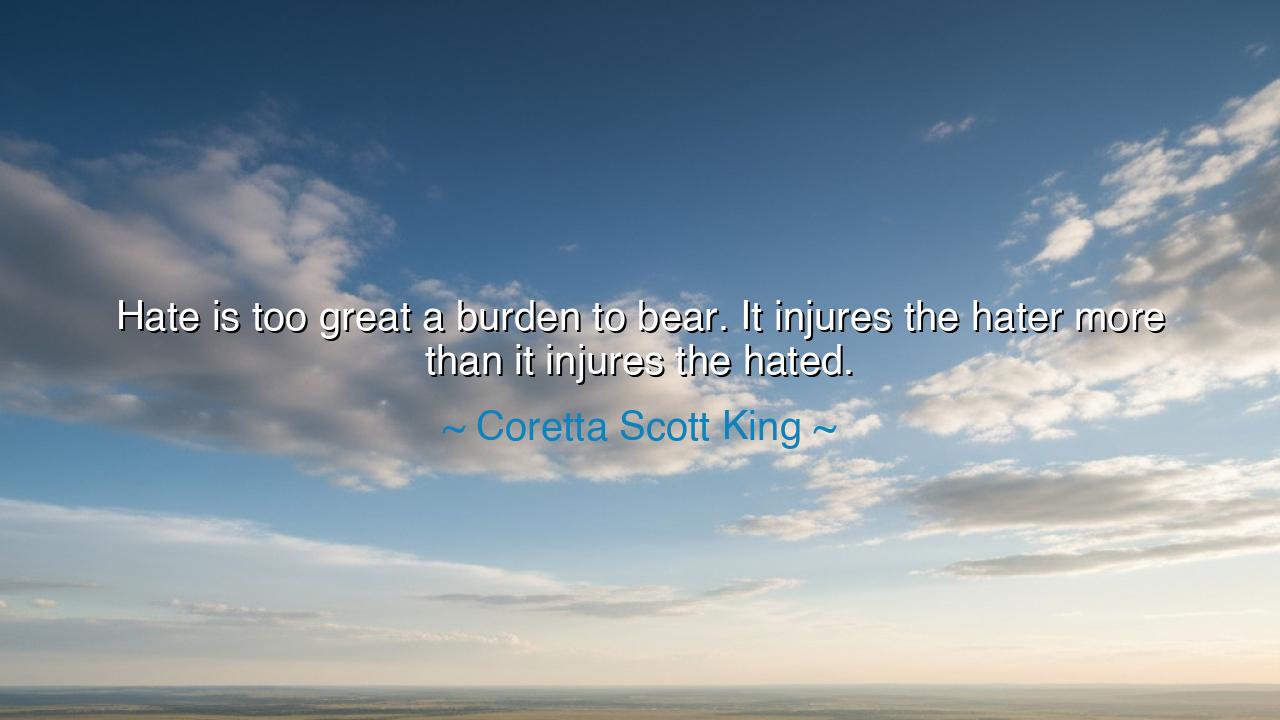
Hate is too great a burden to bear. It injures the hater more
Hate is too great a burden to bear. It injures the hater more than it injures the hated.






In the solemn and radiant words of Coretta Scott King, we find a truth forged in both sorrow and strength: “Hate is too great a burden to bear. It injures the hater more than it injures the hated.” This is not the wisdom of comfort but of endurance—the voice of one who had walked through the valley of loss and yet emerged unbroken. These words are born from the crucible of injustice and grief, yet they shine with mercy. For hate, though it may disguise itself as power, is in truth a chain that binds the soul. It promises righteousness, but delivers ruin; it feeds upon the heart of the one who carries it.
The origin of this saying comes from a life lived in the aftermath of profound struggle. Coretta Scott King, the wife and lifelong partner of Dr. Martin Luther King Jr., spoke not from theory but from experience. After witnessing her husband’s assassination, after enduring threats, hatred, and oppression, she might have chosen bitterness. Yet she chose peace. She understood what the ancients taught—that vengeance is a fire that consumes the vessel that holds it. Her life became a living testament to the higher law of love, the same law that moved her husband to preach forgiveness in the face of violence. When she said these words, she was not commanding others to forget pain, but teaching that to cling to hate is to surrender one’s peace to the very force that caused the pain.
The ancients, too, spoke of this truth. The Stoics taught that anger and hatred are forms of self-destruction, that no external foe can harm the soul as deeply as the passions we harbor within. Marcus Aurelius, emperor and philosopher, once wrote: “The best revenge is to be unlike your enemy.” To live free of hate is to reclaim dominion over the self. Likewise, in the scriptures of many nations, the wise remind us that hatred corrodes the vessel it fills. The Buddhists call it “poison of the heart.” The Christians call it sin. The Greeks called it hubris—a pride that blinds one to reason. All knew what Coretta knew: hate is not strength; it is weakness masquerading as power.
Consider the example of Nelson Mandela, who, like the Kings, bore witness to humanity’s cruelty. Imprisoned for twenty-seven years, he emerged without malice. “As I walked out the door toward the gate that would lead to my freedom,” he said, “I knew if I didn’t leave my bitterness and hatred behind, I’d still be in prison.” His words mirror Coretta’s truth—hatred does not free the oppressed; it enslaves the heart. Mandela’s forgiveness became the cornerstone of his nation’s healing, proving that mercy is the strongest weapon ever forged. Through him, we see that love is not weakness, but the highest form of strength—the courage to rise above vengeance and to lead by light instead of darkness.
To carry hate is to carry a burden heavier than iron, for it grows heavier with every memory, every wound, every injustice relived. It clouds the mind, weakens the will, and drains the joy from life. It is a weight that bows the spirit until nothing remains but bitterness. Coretta’s words are a plea for liberation—not only from oppression, but from the internal prison of hatred itself. The one who forgives is not excusing evil, but refusing to let evil rule their soul. This is the wisdom of those who have suffered deeply and yet chosen peace.
The meaning, then, is both moral and spiritual: to love one’s enemy is not submission—it is transcendence. Hatred diminishes the hater, while compassion restores dignity to both the wounded and the world. To let go of hate is to lay down a weapon that turns inward. It is to choose freedom over fury, creation over destruction. Coretta’s life showed that the work of justice must be guided by love, for justice without love becomes revenge, and revenge becomes the mirror of the very thing it opposes.
The lesson, therefore, is this: guard your heart from hatred, for it is the thief of peace. When wronged, seek understanding before resentment; when wounded, seek healing before vengeance. Remember that every act of forgiveness is an act of power—it breaks the chain of harm and reclaims the right to live fully. To forgive does not mean to forget, but to rise. When you feel the fire of anger, do not feed it with memory, but quench it with wisdom. Speak truth, seek justice, but let love lead your steps, for love alone rebuilds what hate destroys.
So, my listener, carry the wisdom of Coretta Scott King into your days: “Hate is too great a burden to bear.” When you feel the sting of injustice, remember her example—how she chose compassion over vengeance, peace over fury. Let her words be your shield. Release hatred as one lays down a weapon after battle, knowing that the war within must end before the world can heal. For the one who casts off hate becomes free, and in that freedom, they become great. Love, then—not as sentiment, but as strength—and the burden will fall away, leaving in its place the quiet, unshakable power of peace.






AAdministratorAdministrator
Welcome, honored guests. Please leave a comment, we will respond soon